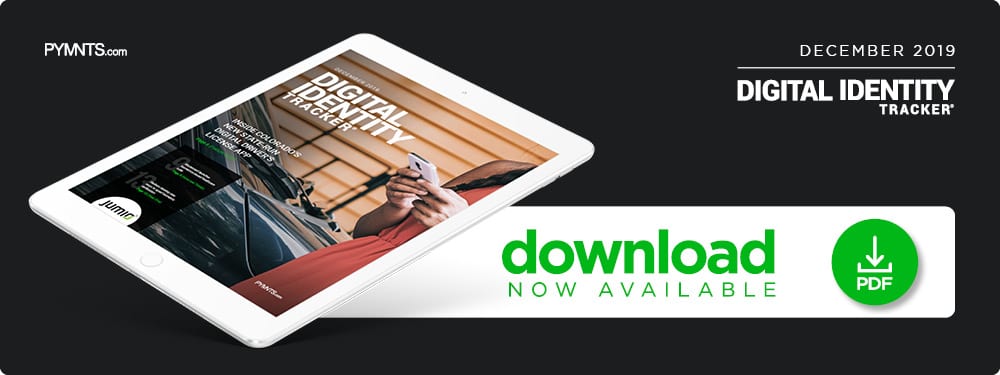Inside The Launch Of Colorado’s New State-Run Digital Driver’s License

Digital identities are growing more important and omnipresent in everyday life, and the need to keep them secure grows more pressing by the day. Financial information, Social Security numbers and a host of other private data is wrapped up in each person’s digital identity, making a potential data breach catastrophic.
Biometrics is one often-used method to prevent this, but even it is vulnerable to fraud. Cybercriminals are exploiting a variety of techniques to fool them, from advanced methods like 3D computer models of human heads to false hands made of putty.
In the December “Digital Identity Tracker®,” PYMNTS explores the latest developments in the world of digital IDs, including a new digital driver’s license in the state of Colorado, a prototype facial recognition system for air travel in Finland and emerging methods that could threaten the validity of biometric authentication.
Developments From the World of Digital ID
China is one of the governments currently exploring the possibilities of digital identities, most recently directing its focus to applications for smart cities. The new system leverages blockchain to provide better connectivity and data-sharing capabilities within these smart cities, of which there are currently 500. The program was developed by three institutes in the city of Shijiazhuang, but will be distributed and managed by the Chinese government.
Apple is also wading into the digital ID field with a recently filed pair of patents titled “Identity Credential Verification Techniques.” Both patents detail systems for replacing traditional driver’s licenses and passports with digital alternatives. The patents underline Apple’s interest in digital ID solutions, being the latest of 65 owned by the company. Most recently, Apple filed for a biometric authentication patent for its Apple Ring wearable .
.
The air travel industry is another eager explorer in the world of digital ID. Finnish airport operator Finavia and Finland’s flag-carrier airline Finnair have completed a pilot program in conjunction with cybersecurity company Nixu to investigate biometric programs for airports. The pilot was intended to ease identity verification by allowing passengers to submit facial recognition scans, rather than submit passports and tickets. The program found no technical issues, but ran afoul of legal concerns, as it could potentially violate the GDPR’s consent laws.
For more on these and other digital identity news items, download this month’s Tracker.
How Colorado Enabled Digital Driver’s Licenses With the myColorado App
Driver’s licenses are one of the most common traditional identity verification methods, making them a natural fit for a digital facelift. The state of Colorado is one of 12 states currently developing a digital driver’s license program, with the launch of its myColorado app in October.
For this month’s feature story, PYMNTS spoke with Russell Castagnaro, director of digital transformation at the Colorado Governor’s Office of Information Technology, about the ins and outs of myColorado’s functionality, and how it meets residents’ concerns about security and privacy.
Deep Dive: Biometrics Continue to Fall Victim to Spoofs and Other Hacks
Biometrics are becoming extremely popular among digital ID providers and implementers, due to their appealing dual functionality of security and seamlessness. Hackers are hard at work developing means to circumvent them, however, creating sophisticated spoofing techniques to impersonate legitimate users, or bypass the verification entirely.
This month’s Deep Dive explores the various spoofs and hacks used to breach biometric systems, and how developers are leveraging liveness detection and white-hat hackers to stop them.
About the Tracker
The “Digital Identity Tracker,” done in collaboration with Jumio, is the go-to monthly resource for updates on trends and changes in the digital ID industry.


